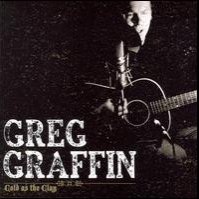There's certainly nothing contrived about Greg Graffin going the Americana route, as elements of folk and roots rock have appeared not-too-subtly in his lyricism and songwriting for years. Skimming over the Bad Religion songbook you'll find songs like "Faith Alone," "The Answer," "Cease" and "Streets of America" all credited to this half of that band's songwriting team. None of these were songs that, at their core, needed anything more than the conviction of the vocalist and an acoustic guitar to succeed. On a personal level, to hear Graffin muse on the influence of Neil Young and the Band on his Bad Religion work is fascinating. I first became seriously interested in music through punk records like Suffer as a teenager, only to arrive at Music from Big Pink, Harvest and the like in college. I get a great deal of closure knowing now that Graffin acknowledges that connection, and is reflecting upon it with these songs. Cold as the Clay ties a great number of threads in my personal listening history together, and for doing so has become very dear to me in a very short time.
Cold as the Clay is split between two groups of musicians, the first being the much publicised appearances of Stephen Carroll, Greg Smith and Jason Tait of Winnipeg's Weakerthans. Considering the folk tendencies and rural romanticism wrapped into every Weakerthans record, the decision to invite them to this project was an inspired one. Here they back Graffin on the album's modern, introspective country-rock fare. These were primarily songs penned by Graffin himself; a fairly direct line can be drawn from these to some of Bad Religion's calmer, reflective work. The album opening "Don't Be Afraid to Run" is a half spin of the volume knob and a dressing of distortion away from reaching that. Think Crazy Horse with Graffin's wise baritone standing in for Young's nasal tenor. The Weakerthans know their craft, and give these songs the ornamentation that a relaxed tempo allows. Perhaps that's something Bad Religion couldn't have comfortably done.
Intersecting Graffin's own songs are a collection of traditional standards. Producer Brett Gurewitz wisely kept these songs as authentic as possible, employing a number of musicians who could confidently present the sound. Joe Wack, Chris Berry and David Bragger contribute a lush bed of old-time guitar, banjo, fiddle and mandolin. Incomparable folk-jazz chanteuse Jolie Holland is present for many of these tracks, her subtle vocals going lengths to brighten Graffin's own. What results is a playful, uplifting feel to tunes like "Little Sadie" and "Willie Moore." There's a lightness to the roots material that's a complete contrast to Graffin's more conventionally structured songs. That he allows his vocals to flow with the spirit of these songs shows a great deal of respect for the source material. It would be too easy to trample over such delicate and well-honed musicianship, particularly if the mix favoured a voice as strong as Graffin's and tried to match it in volume. Credit is certainly due to Gurewitz for properly capturing this and maintaining the careful balance with the Weakerthans-backed rock songs.
There's a duality to this record and it's handled so well. Here you have two distinct styles, recorded and mixed in the way each demands, yet there's nary an abrupt shift between them. There are two very different sets of musicians here, separated by generation, genre and even nationality, yet Cold as the Clay was recorded in a week and sounds wonderfully effortless. Graffin's prior solo record was fuelled by personal tragedy and as such couldn't be further from Cold as the Clay. More than anything Greg Graffin's been a part of, this is a celebration.
